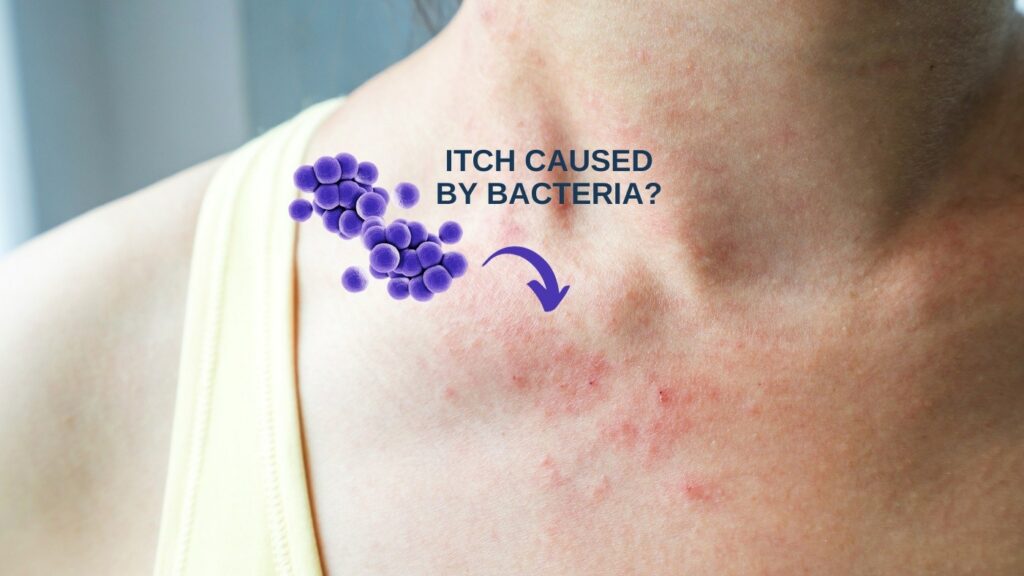Eczema sufferers, there’s some hopeful news on the horizon. Scientists have uncovered a fascinating link between the bacteria Staphylococcus aureus and the relentless itching that characterizes eczema.
Researchers have known that people with eczema tend to have higher amounts of Staphylococcus aureus on their skin. But, are they there because of your scratching? Or are they actually triggering the itch directly? It turns out, the latter may be true.
This groundbreaking research, recently published in the journal Cell, reveals how a specific enzyme produced by this bacterium can directly trigger itchiness by acting on the nerve cells in the skin.
What it Means for Eczema Sufferers
For those struggling with eczema in Singapore, this discovery could be a game-changer. This condition, affecting a significant portion of the population (20% of children and 10% of adults), has long been associated with an immune system response that causes inflammation.
However, this new research shifts the focus towards the role of skin-colonising bacteria in causing itchiness, opening up new avenues for treatment.
When Even a Light Touch Can Trigger Uncontrollable Itching
Eczema is more than just a skin condition; it’s a source of constant discomfort and distress for many in Singapore. The incessant need to scratch can lead to damaged skin, sleep disturbances, and even emotional distress.
There are many ways to manage the itch, such as wearing smooth, breathable fabrics such as eczema gloves or eczema sleeves. But, with this new research, perhaps the most effective way to combat itching in the near future could be by addressing the microbial factors.
Isaac Chiu, a scientist at Harvard Medical School, has been at the forefront of this research. In this interview, he explains how his team’s investigation revealed that Staphylococcus aureus, commonly found on eczema patients’ skin, releases protease V8, an enzyme that activates a protein in nerve cells, causing the itch sensation.

Liwen Deng, another researcher at Harvard, said that their team used an anti-clotting drug that was already FDA-approved, to block this itch-inducing mechanism. In the same interview, he said, “We treated [lab mice] orally with the drug, and it completely blocked the itching and scratching,” Deng shared.
What do we know so far about bacteria and eczema?
Here is some previous research that set the groundwork for this recent discovery:
- Totté et al. (2016): This study highlighted that Staphylococcus aureus could be isolated from about 70% of eczema skin lesions.
- Mc George et al. (2008): This study showed that Staphylococcus aureus can cause secondary infections in eczema
- Hülpüsch et al (2021): This study showed that, during skin flare-ups, the normal balance of microbes on the skin is disrupted, leading to an overgrowth of S. aureus.
How Far Away Are We From An Actual Treatment?
It’s worth noting that the treatment they used to reduce the itch-causing enzyme, is already FDA-approved as an anti-clotting drug. This could shorten the time needed to bring an actual product to market.
But don’t get your hopes up just yet. While this discovery is exciting, it’s important to note that the journey from lab findings to mainstream medical treatment is often long and complex. The potential for creating a topical medication from this anti-clotting drug is there, but further research and clinical trials will be necessary to ensure its efficacy and safety for human use.
In the meantime, until such treatments become available, eczema sufferers in Singapore can manage their condition through various means. Some current tried and tested methods include:
- Applying antibacterial gel to skin that has been damaged from scratching
- Reducing inflammation with natural oils
- Protecting the area with smooth breathable fabrics
Let’s hope that these new discoveries will pave the way for safe and innovative treatments in the future! Always consult with your healthcare professional if you need help to manage your eczema effectively.

